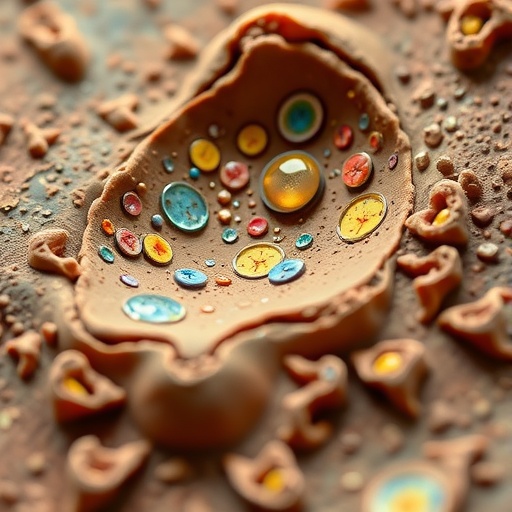In an astonishing revelation that has captured the imagination of scientists and enthusiasts alike, a groundbreaking study published in the journal Commun Earth Environ has indicated the potential for extracting fragmented deoxyribonucleic acid (DNA) from the surface rocks of Mars. As interest in the exploration of the Red Planet surges, this study paves the way for novel insights into the prospects of ancient life forms and the detailed history of Mars’s biological legacy, if any exists.
The study, led by a distinguished team of researchers including MP. Zorzano and J. Basapathi Raghavendra, has harnessed advanced techniques to analyze Martian rock samples. The primary focus revolves around understanding the conditions under which DNA might persist in an extraterrestrial environment like Mars. The implications of their findings are profound, suggesting that remnants of ancient life could be retrievable from the Martian surface, thus reshaping our approach to astrobiology.
Researchers utilized innovative methodologies that combined field simulations and laboratory experiments to replicate Martian conditions. By simulating the environmental factors prevalent on Mars, such as radiation levels, temperature fluctuations, and arid conditions, the team sought to uncover whether DNA could survive these harsh elements over time. Results have shown that certain types of DNA can indeed withstand extreme conditions, leading to the tantalizing possibility that similar forms could be recovered from Martian rocks.
Another facet of this research is its emphasis on the selective resistance of certain DNA molecules to degradation. The scientists determined that specific environmental factors, including the mineral composition of Martian rocks, play a crucial role in protecting DNA from degradation. This points to the potential for developing targeted extraction methods that could isolate preserved DNA, providing invaluable insights into the historical biological activity on Mars.
The notion that life once thrived, or may still thrive, on Mars is not new; however, the capacity to extract and analyze DNA transforms speculation into actionable research. With missions like Perseverance rover tasked with collecting samples from the Martian surface, this study serves as a crucial guide for future explorations. The nexus between molecular biology and planetary science has never been more apparent, setting the stage for extraordinary discoveries ahead.
To ensure robust results, the team employed various techniques to stabilize and concentrate potential DNA samples from Martian-like substrates. These techniques revolved around the extraction and purification processes often utilized in Earth-based laboratories, albeit adapted to account for the highly distinct characteristics of Martian geology. The findings imply that biological markers could be preserved in rock matrices for billions of years, waiting for the right technology to unearth them.
The researchers are keen to note that their work does not assert the existence of life on Mars but rather opens the door to the possibility. In light of this, validating whether any collected DNA contains characteristics indicative of living organisms will be the next scientific frontier. Future missions focused on astrobiology will likely heed these findings, directing their endeavors toward zones where DNA preservation is most feasible.
Moreover, as missions expand to explore the Martian subsurface, the study highlights the pressing need for advanced methodologies to analyze samples in situ. Developing instruments capable of detecting DNA or related organic compounds directly on Mars could revolutionize our understanding of the planet’s potential to harbor life. This aligns with the overarching goals of planetary exploration—searching for signs of life beyond Earth.
Understandably, the excitement within the scientific community over the potentials of DNA extraction from Mars is not merely confined to astrobiological implications but also enhances interdisciplinary dialogue. It bridges the divide between biology, geology, and planetary science, prompting a more integrated approach to understanding extraterrestrial processes. This collaborative methodology stands to yield richer, more nuanced insights into our neighboring planet’s past.
The implications of this research extend even to the fields of bioengineering and biotechnology on Earth. Understanding how DNA can withstand extreme environmental stresses opens avenues for biotechnological applications, potentially informing processes like gene conservation and synthetic biology. The resilience of DNA against harsh conditions may inspire innovative solutions for preserving genetic materials in our increasingly volatile climate.
In essence, the findings within this study represent a confluence of optimism and scientific inquiry. As humanity sets its sights on Mars, the prospect of discovering ancient DNA reshapes our timeline concerning extraterrestrial life. Should future missions corroborate these results, it would mark a monumental milestone, fundamentally challenging our understanding of life and evolution beyond Earth.
The research underscores the notion that each rock and soil sample on Mars holds secrets waiting to be unraveled. With renewed emphasis on technological advancement and interdisciplinary collaboration, the quest for Mars’ biological narrative is likely to advance rapidly. In the coming years, as exploration technology evolves, we may find ourselves on the brink of extraordinary scientific revelations linked to our cosmic neighbors.
In conclusion, this study is not just a scientific paper but a herald of what may lie ahead in our cosmic exploration. The quest for understanding the DNA possibilities on Mars sparks imagination and creativity in scientific pursuits and evokes a broader philosophical inquiry into our place in the universe. As we eagerly await the results of forthcoming missions and insights into our interplanetary neighbor, this research serves as a guiding light in the journey toward uncovering the mysteries of Mars.
Subject of Research: The potential for extracting fragmented DNA from Mars’s surface rocks.
Article Title: Fragmented deoxyribonucleic acid could be extractable from Mars’s surface rocks.
Article References:
Zorzano, MP., Basapathi Raghavendra, J., Carrizo, D. et al. Fragmented deoxyribonucleic acid could be extractable from Mars’s surface rocks.
Commun Earth Environ 6, 838 (2025). https://doi.org/10.1038/s43247-025-02809-w
Image Credits: AI Generated
DOI:
Keywords: Mars, DNA extraction, astrobiology, extraterrestrial life, planetary science.




